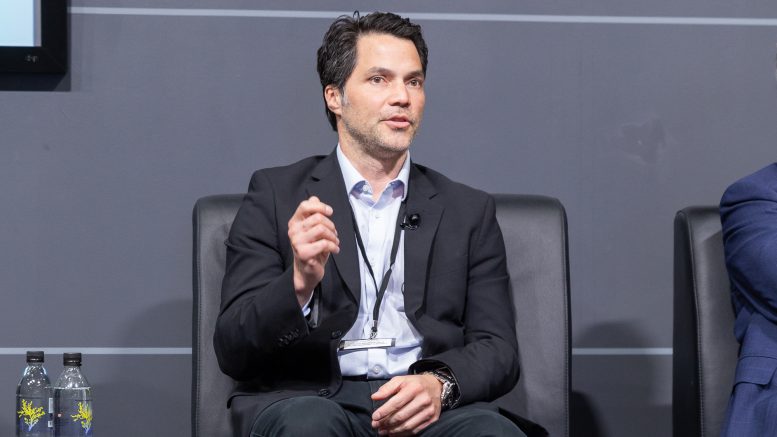The mining and smelting industry has faced environmental risks for decades, but now new mineral extraction and metallurgical technologies are helping to mitigate them.
Dundee Sustainable Technologies has developed two key technologies: CLEVR, a cyanide-free gold extraction process; and GlassLock, a process for the removal and stabilization of arsenic.
“What we were really trying to do was address some of the challenges that the industry is facing in terms of environmental challenges and metallurgical challenges and that’s what really drove us [to innovate],” the company’s president and CEO, Jean-Philippe Mai, said on the Process Innovation Panel at the Global Mining Symposium at the TSX on May 25. “Both of our processes have been developed and demonstrated at the industrial scale and we are now commercializing them within the mining industry.”
The CLEVR process offers a cleaner, more efficient, and cost-effective alternative for gold extraction, Mai said. It doesn’t use cyanide or produce toxic liquid or gaseous effluents. The process cuts contact times from more than 36 hours to about two hours, and is a closed loop, which means all reagents are re-circulated. That eliminates the need for tailings ponds.
The company’s GlassLock process removes the arsenic often linked to gold, copper, silver or polymetallic deposits, and incorporates it into a stable and insoluble glass product that can contain up to 20% arsenic.
Applications can include metallurgical flue dusts (smelting); mineral concentrates (arsenopyrite, cobaltite, enargite, and tennantite); soluble arsenic in Pregnant Leach Solutions (PLS), acidic or alkaline; and arsenic in tailings, tailing drainages and wastewater.
Novel technologies like these ones are critical for a greener future, he argued.
“We know that mining is a rather conservative industry, however there’s always been a desire and a strong interest for project developers and miners to innovate and improve their projects through processes, improved ESG policies and actions,” he told The Northern Miner’s Editor-in-Chief Alisha Hiyate, who moderated the panel. “With a lack of or very few really novel innovations and processes to be offered to the industry I think now we are filling in one of these gaps here.”
Mai, who has spent over 15 years in the mining industry as a geologist, senior project manager and executive in coal, base metals and gold projects in Canada, Australia and South America, noted that the new technologies will cut costs as well as meet increasingly stringent environmental requirements.
“A true definition of innovation is processes that are improving operational efficiencies and improving environmental practices,” he said, adding that changing recovery methods has a huge impact on the project, whether it is reducing its footprint, eliminating the use of tailings ponds, using dry stack tailings or removing contaminants. “All of these aspects can definitely improve the economics of a project,” he said.
Dundee works with project developers and miners to test and apply its processes on specific projects, ore, and mineralogy.
“Typically, a company can send us some samples, we’ll run some preliminary test work, some optimization test work and then using the data that is generated by using our industrial demonstration campaign, we can build numeric process models and then output opex and capital costs associated with the incorporation of our processes within a specific project,” Mai said.
The Montreal-headquartered Dundee has more than 50 patents in more than 15 countries.


Be the first to comment on "Video: Dundee’s process innovations help miners get greener "